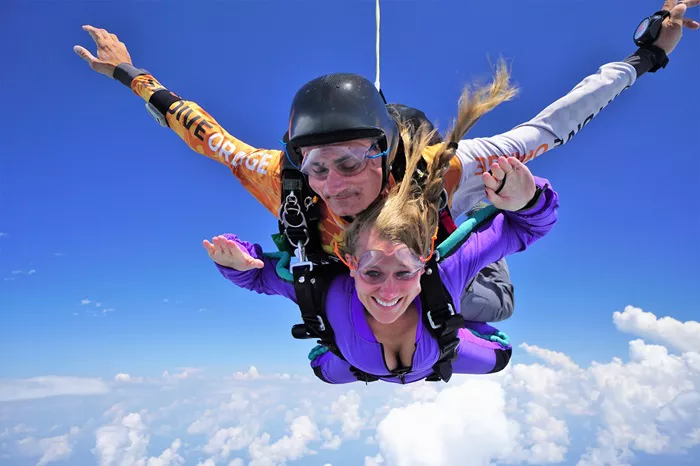Skydiving is an exhilarating and life-changing experience that offers an unparalleled adrenaline rush. However, to ensure a safe and enjoyable jump, it’s crucial to avoid certain activities and behaviors before taking the plunge. This guide will walk you through the key precautions you should take to make your skydiving experience as smooth and safe as possible.
Avoid Alcohol and Drugs
The Importance of Being Sober
Skydiving requires full mental clarity and physical coordination. Alcohol and drugs impair judgment, reaction time, and coordination, increasing the risk of accidents.
Effects on Physical and Mental Performance
Delayed Reaction Times: Alcohol and drugs slow your reaction times, which can be dangerous during a skydive.
Impaired Judgment: Your ability to make quick, rational decisions is compromised.
Reduced Coordination: Fine motor skills and overall coordination suffer, making it harder to control your body in freefall.
Recommended Time Frames
It’s advisable to avoid alcohol and drugs for at least 24 hours before your jump. Some substances may require a longer period to fully clear from your system, so plan accordingly.
Avoid Heavy Meals and Unusual Foods
The Risks of Eating Too Much
A heavy meal can cause discomfort, nausea, and even vomiting during your jump. It’s important to eat light and healthy foods before skydiving.
Foods to Avoid
Greasy and Fatty Foods: These can cause indigestion and nausea.
Spicy Foods: These can lead to heartburn and discomfort.
New or Unusual Foods: Stick to what your body is accustomed to, to avoid any unexpected reactions.
Ideal Pre-Skydive Meal
A light, balanced meal consisting of lean protein, complex carbohydrates, and plenty of water is ideal. This will provide sustained energy without causing discomfort.
Avoid Overexertion and Exhaustion
The Importance of Rest
Skydiving is physically demanding, and being well-rested is crucial for peak performance. Lack of sleep can lead to fatigue, decreased concentration, and slower reaction times.
Signs of Overexertion
Muscle Fatigue: Soreness and tired muscles can hinder your ability to control your body during the jump.
Mental Fatigue: Difficulty concentrating and slower cognitive functions.
Tips for Rest and Recovery
Get Adequate Sleep: Aim for 7-9 hours of quality sleep before your skydive.
Avoid Intense Workouts: Refrain from heavy lifting or intense exercise the day before your jump.
Avoid Excessive Caffeine
How Caffeine Affects Your Body
While caffeine can boost alertness, too much can lead to jitteriness, increased heart rate, and dehydration—none of which are ideal for skydiving.
Managing Your Caffeine Intake
Moderation is Key: Stick to a moderate amount of caffeine, such as one cup of coffee.
Hydrate: Drink plenty of water to counteract caffeine’s dehydrating effects.
Avoid Skipping the Pre-Jump Briefing
The Importance of the Briefing
The pre-jump briefing is critical for understanding the procedures, safety measures, and what to expect during your jump.
What You’ll Learn
Equipment Usage: How to properly use your skydiving gear.
Body Positioning: The correct posture for freefall and landing.
Emergency Procedures: What to do in case of an emergency.
Being Fully Present
Listen carefully, ask questions, and ensure you understand everything before proceeding. This knowledge is vital for a safe and enjoyable experience.
Avoid Wearing Inappropriate Clothing
Choosing the Right Outfit
Comfort and safety should guide your clothing choices. Loose, comfortable clothing that allows full range of motion is ideal.
Clothing to Avoid
Baggy Clothes: These can get tangled in the equipment.
Heels or Open-Toed Shoes: Wear secure, closed-toe shoes with good grip.
Recommended Attire
Opt for athletic wear and sneakers. Dress in layers if it’s cold, but avoid bulky items that can interfere with your harness.
Avoid Neglecting Hydration
Staying Hydrated
Proper hydration is crucial for maintaining energy levels and preventing cramps. Dehydration can lead to dizziness and decreased physical performance.
Hydration Tips
Drink Water: Start hydrating the day before and continue with small sips on the day of your jump.
Avoid Diuretics: Limit intake of beverages like coffee and soda that can dehydrate you.
Avoid Ignoring Your Health Condition
Assessing Your Fitness for Skydiving
Skydiving is a physically demanding activity, and it’s essential to ensure you’re in good health before jumping.
Health Conditions to Consider
Cardiovascular Issues: High blood pressure, heart problems, and other cardiovascular conditions.
Respiratory Issues: Asthma or other breathing difficulties.
Musculoskeletal Issues: Back, neck, or joint problems.
Medical Clearance
Consult with your doctor if you have any health concerns. Some conditions may require medical clearance to ensure it’s safe for you to skydive.
Avoid Underestimating Weather Conditions
The Impact of Weather on Skydiving
Weather conditions significantly affect the safety and enjoyment of your jump. High winds, rain, and poor visibility can be dangerous.
Checking the Forecast
Wind Speed: Ideal conditions have wind speeds below 15 mph.
Cloud Cover: Clear skies are preferable for optimal visibility.
Temperature: Dress appropriately for the weather conditions.
Being Prepared for Changes
Weather can change quickly, so be flexible with your plans. Trust your instructor’s judgment if they advise postponing due to weather conditions.
Avoid Stress and Anxiety
Managing Pre-Jump Anxiety
Feeling nervous before your first skydive is normal, but excessive stress and anxiety can negatively impact your experience.
Techniques to Stay Calm
Deep Breathing: Practice deep breathing exercises to calm your nerves.
Positive Visualization: Visualize a successful and enjoyable jump.
Talk to Your Instructor: Sharing your concerns can help alleviate anxiety.
see also: How Hard Is It To Breathe While Skydiving?
Enjoy the Experience
Remember, skydiving is meant to be fun and exhilarating. Trust your training, your instructor, and focus on the excitement of the experience.
Conclusion
Preparing for your first skydive involves more than just signing up and showing up. By avoiding these key pitfalls—alcohol and drugs, heavy meals, overexertion, excessive caffeine, skipping the briefing, inappropriate clothing, dehydration, ignoring health conditions, underestimating weather conditions, and allowing stress to take over—you can ensure a safe, enjoyable, and unforgettable skydiving adventure.
Take these precautions seriously, and you’ll be well on your way to a thrilling and safe skydiving experience. Happy jumping!

